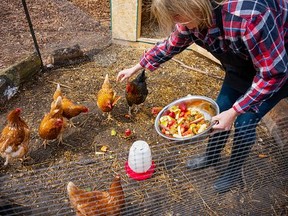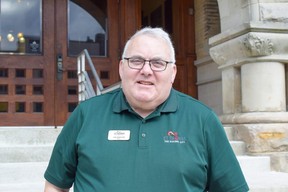With avian flu threatening flocks in Ontario, now is not the time to consider allowing backyard chickens, St. Thomas politicians are being told.

With avian flu threatening flocks in Ontario, now is not the time to consider allowing backyard chickens, St. Thomas politicians are being told.
In a report going to city council Monday, staff recommend postponing a decision on a pilot project to allow keeping chickens in residential areas because of concerns about the highly contagious bird flu and the costs associated with monitoring it.
Beth MacDougall-Shackleton, an expert in the ecoimmunology and behavioral ecology of migratory birds, agrees with the recommendation, saying the bird flu continues to be a “huge concern” for large-scale poultry operations and wild bird populations.
“Anything that we can do to reduce contact between wild and domestic birds is important,” said MacDougall-Shackleton, a biology professor at Western University.
“It can be challenging to keep backyard chickens fully away from wild birds.”
-

St. Thomas politicians don’t dismiss backyard hens, but concerns persist
-

Move over Jumbo: St. Thomas ponders backyard chickens
Ontario is the county’s largest producer of turkeys and chicken, with much of the industry in Southwestern Ontario.
As of late May, almost 850,000 birds in the province have been killed as a result of the highly pathogenic H5N1 strain of bird flu since the most recent outbreak began early last year, the latest figures from the Canadian Food Inspection Agency show. Outbreaks have been identified in commercial and non-commercial flocks in Chatham-Kent and Middlesex, Oxford, Lambton, Wellington and Norfolk counties.
In early April, the food inspection agency announced a pet dog in Oshawa had contracted the virus and died after chewing on a wild goose. The agency called it “the only case of its kind in Canada” but warned the risk of spread to the general public remains low.
The report headed to St. Thomas politicians details how a pilot program allowing backyard chickens would be controlled and regulated and provides options to proceed. Staff suggested the decision be deferred one year, pending more information about the concern of the bird flu and the “considerable costs” and resources required to administer the city-wide program safely.
Mayor Joe Preston said he’s heard from an even split of residents, some favoring and others against a backyard chicken pilot program, but urged erring on the side of caution.

“Of course, it’s council’s decision, but the recommendation from staff has some pretty sharp logic to it, that we know of a procedure when we want to do it, but let’s wait and see where avian flu is going,” he said.
In Toronto, officials are considering ending the city’s backyard hen pilot program that started in 2018 because of concerns over the avian flu. Expanding the program, which could require three animal-control officers and one supervisor, would cost about $500,000 annually.
“While a similar program in St. Thomas would obviously not generate such interest and costs, there would be costs to the city to operate the program and those need to be taken into account,” staff wrote in the report.
Large-scale chicken farms have dealt with the threat of avian flu for a long time, but it would be challenging for a backyard chicken owner to keep their birds separate from wildlife, MacDougall-Shackleton said.
That would include taking down feeders and covering water sources to discourage other bird species from entering the area and potentially spreading the disease, she said.
With avian flu outbreaks across the region, MacDougall-Shackleton advised about the potential dangers of feeding birds in a park or open area.
“We often see the disease being transmitted by people that are animal lovers and, specifically, bird lovers,” she said.
People feeding waterfowl “are doing that because they love the animals, but it often encourages them to congregate and can spread disease. So, people need to be cognizant of the unintended effects of attempting to help wildlife.”
The Local Journalism Initiative is funded by the Government of Canada

Comments
Postmedia is committed to maintaining a lively but civil forum for discussion and encourages all readers to share their views on our articles. Comments may take up to an hour for moderation before appearing on the site. We ask you to keep your comments relevant and respectful. We have enabled email notifications—you will now receive an email if you receive a reply to your comment, there is an update to a comment thread you follow or if a user you follow comments. Visit our Community Guidelines for more information and details on how to adjust your email settings.
Join the Conversation